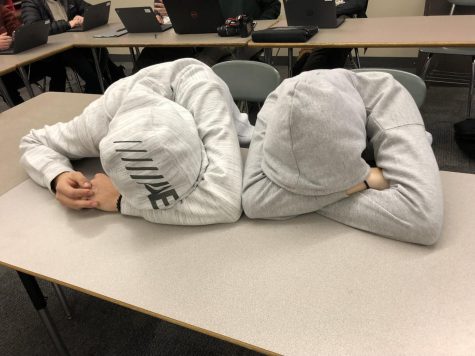Zzzzzzzzz…
January 9, 2019
7:44 am. You are running down the hallway, tripping over your own feet and rubbing the blur from your eyes, as you try to make it to class on time. Disheveled and panting, you scurry into your seat, dig through your backpack to find a pencil, and reluctantly begin taking notes. Yet, it isn’t long until you are trying to tell your neck muscles that the desk is not a pillow and telling your eyes that it is not closing time. An unrelenting fog clouds your brain, making it nearly impossible to focus or retain any information. Going unnoticed, teenagers across the world experience this exact situation every single morning. Lack of sleep is an unrecognized global epidemic that is greatly impacting teenagers’ academic performance.
Since teenagers are severely impacted by lack of sleep, we interviewed Ipswich High School student, Cate Phypers, to gain insight into her sleep habits. When asked about how her academic performance is impacted by lack of sleep, Cate responded by saying, “When I get enough sleep, I am more focused and perform better on tests and quizzes; however, when I stay up late, I am extremely tired in the morning and it severely affects my performance in school.” In addition, Cate believes that students should get at least seven hours of sleep each night in order to stay healthy and be productive the following day.
To get another perspective about the importance and impact of sleep, we interviewed Marnie Stasiak, a nurse at Ipswich High School. Marnie, as many of the students at IHS call her, gives detailed observations about what occurs in her office on a regular basis. When asked how many students visit the nurse’s office each day to take a nap, she stated that “about two to three students, who say they are tired, visit my office. Personally, I believe that most students are stressed, which is affecting their sleep.” In addition, she suggests changes in sleep habits that can lead to a more productive lifestyle. For example, Marnie advises “that students start studying a few days before a test, instead of cramming it all in the night before.” Furthermore, she suggests to “not drink coffee after the morning.” Overall, Marnie’s medical knowledge provides an understanding into the how lack of sleep is severely impacting teenagers.
Although the opinions of a qualified nurse and high school student provide insight into the importance of sleep, the statistical evidence further highlights the seriousness of getting a sufficient amount of sleep. In a National High School Study, about 7 out of 10 (72.7%) teenagers did not get enough sleep on school nights. In addition, the National Sleep Foundation conducted a study that found that “about 69% of children experience one or more sleep problems a few nights a week.” Overall, studies continue to exhibit the importance of sleep in order to heal damaged cells, boost the immune system, and recover from rigorous activities.
Lack of sleep is a serious issue that is affecting teenagers’ academic performance and quality of life. Steps need to be taken in our society to allow teenagers time to receive sufficient amounts of sleep. However, this is not something that can be changed with a flip of a switch so for now, flip that switch off and sleep on it.

